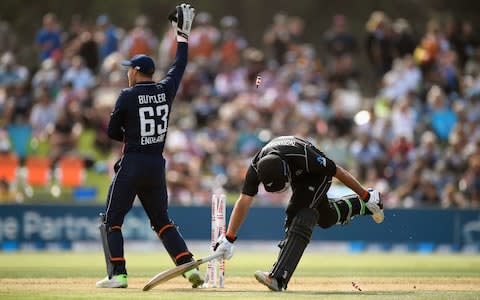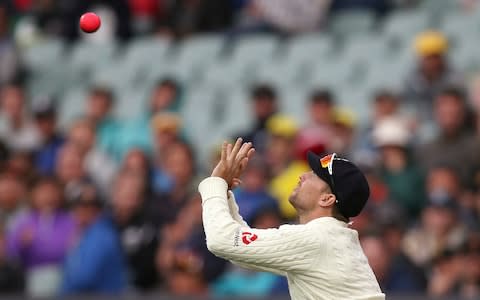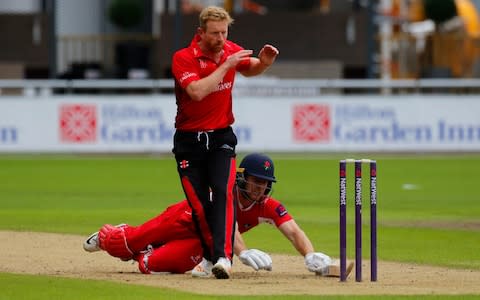Exclusive interview: How England's head coach in waiting Paul Collingwood likes to operate

England has never produced a cricket head coach of world class. Their five-month tour of Australia and New Zealand, however, has seen the rapid development of one who could become the first.
Paul Collingwood, Durham’s 41 year-old captain, has nominally been England’s fielding coach. But he filled in as their bowling coach once Shane Bond’s temporary contract ended after the second Test in Adelaide, and he was the first England batsman to score a Test double-century in Australia after the Second World War, so he knows a thing or two about batting.
England’s lack of world-class coaches - even Zimbabwe has produced a couple - has to be multi-factorial. One main reason must be that former England captains have gone into the media and given coaching a miss, put off by the ECB’s highest Level 4 certificate which is theoretical to the point of abstruse.
Collingwood has learned his coaching pragmatically. He captained England to a World T20 finals triumph, their solitary global trophy, in 2010. When England won the Ashes in Australia in 2010-11 he was Andrew Strauss’s right-hand man - Alastair Cook, official vice-captain, was allowed to concentrate on batting. Durham, for years under Collingwood, punched above their financial weight.
And over the winter all this experience has been put into effect. In the recent ODI series against New Zealand, England’s fielding touched perfection at times, like in the second match when they brought off four run-outs to equal the national record - and if Jason Roy had not fluffed an easy run-out it would have been a record five. Jonny Bairstow attacked the ball from deep square-leg at astonishing pace; David Willey, having stopped and dropped the ball with his right hand, recovered to beat Ross Taylor with his left by throwing almost under-arm - a style Collingwood is teaching in-fielders because an over-arm throw can waste time.

During the Ashes series Australia dropped 12 chances; England dropped three, as calculated by the TMS scorer Andrew Samson. Australia’s bowlers, of course, by bowling faster or spinning it harder, generated more chances yet it was still some achievement. Exact figures, dating way back, have never been kept but almost certainly Joe Root’s team were the safest catching side England have sent to Australia: by no means the swiftest or best, because they had few athletes, yet that makes a total of three misses in five Tests all the more creditable.
In their previous series, against West Indies at home, England had dropped 16 chances in three Tests. “Gully was the main culprit - about nine were in the gully area,” said Collingwood, who was busy leading Durham at the time, did his research later, then implemented his ideas in Perth at the start of the Ashes tour.
“We tried a few slip combinations and instantly you recognised Dawid Malan had really good hands and moved well, so he was third slip. Also giving James Vince the confidence (after he had shelled a few in the first phase of his England career) - straightaway we said: 'Vincey, you’re going to be in the gully, that’s your position.'

"You noticed he had really good hands and moved well. So it was getting someone nailed down, we’re not swapping and changing. Let’s get comfortable with each other in these positions and go from there.”
After work on their technique and posture, neither Malan nor Vince missed a catch in the Ashes.
“Apart from that it was just getting the attitude right," Collingwood continued. "A lot of people use the phrase about hunting in a pack. To me it’s about being brave and aggressive and that isn’t about being aggressive verbally, it’s our body language and in Australia it’s as crucial as anywhere. The batsmen can sense that the fielders are up for it, that’s when you build that pressure. Australia can be all over you if you slacken off in the field.
“It’s not always the coach’s job to talk. Much of the time it’s Rooty who’ll get the guys going. I generally don’t say a lot other than: ‘Make sure you’re always working for the team and trying to make a difference as a fielder.’ A lot of the time coaches say things for the sake of it.

“There are times when they’re having partnerships, and it’s hot - I like that philosophy of never show them weakness, because you’re going to play against them all through your career so never shy out of it. No matter how tired you are, keep going because that to me shows real inner strength. That’ll be something you try and drive into them - when it gets really hard, keep buzzing. And I think that’s really powerful for the bowlers as well to see the fielders still going.
“I was really impressed with the spirit throughout (the Ashes). I’ve seen teams under that kind of pressure disintegrate.” It is true. In this winter’s Ashes England came second; in 2013-14 they came third.
It may seem strange that Collingwood is not in New Zealand for England’s two-Test series but Strauss directed him to Barbados to gain head-coach experience with the North in their three one-day matches against the South. Last year, when this longstanding rivalry was revived, Ottis Gibson coached the North and soon became South Africa’s head coach. If this is a pattern, England will not have to look far after Trevor Bayliss retires in the autumn of 2019.

 Yahoo Sport
Yahoo Sport 





































